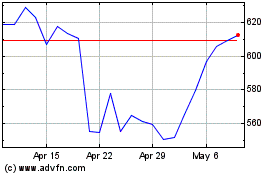Canada Targets Online-Streaming Services With Cultural Levy
04 November 2020 - 8:33AM
Dow Jones News
By Paul Vieira
Canada proposes to compel online streaming services to set aside
part of their revenue to fund domestic television and music
production as the government looks to force global digital players
to make a bigger contribution to the local economy.
The move, unveiled Tuesday by Canadian officials, would also
order streaming services such as Netflix Inc., Amazon.com Inc.'s
Prime Video, Walt Disney Co.'s Disney+, and Spotify Technology SA
to meet certain Canadian-content requirements, such as more
programming to serve the country's francophone and indigenous
populations.
Canada's broadcast regulator estimates, according to its most
recent financial data, that streaming services record annual
revenue of roughly 5 billion Canadian dollars, or the equivalent of
$3.77 billion. Canada is eyeing nearly C$1 billion a year to
finance the making of Canadian television shows, films and
music.
Canada's regulatory reach is the latest example of how countries
are trying to ensure a level playing field between domestic
industries and large global technology companies, which aren't
necessarily subjected to local laws when it comes to providing
their wares, such as entertainment, and paying taxes.
"This is about our cultural sovereignty. It's about investment
and jobs. It's about equity," said Steven Guilbeault, Canada
heritage minister. "We are asking these large and wealthy companies
to invest in Canadian artists, in the same way Canadian
broadcasters already have regulatory obligations."
Mr. Guilbeault said Canada's Liberal government intends to
pursue additional tax-related issues focused on bigger companies in
the technology sector, such as Facebook Inc. and Alphabet Inc.'s
Google. The discussion of digital taxes, as proposed by European
countries like France, has triggered trans-Atlantic friction and
the threat of tariffs from Washington on European goods and
services for unfair targeting of U.S. technology companies.
The changes are outlined in legislation to be introduced to the
Canadian legislature for approval. The Liberal government runs a
minority government, so it would require the support of another
party to put through changes. Some of the crucial regulatory
details will be established by Canada's broadcast regulator, the
Canadian Radio-television and Telecommunications Commission, after
legislation is passed.
Officials said the changes are meant to address a regulatory
imbalance, as streaming services from abroad are making inroads in
the Canadian economy at the expense of the domestic cultural
industry. Under the proposed revamp, online-streaming services
would be defined as broadcasters under Canadian law, and thereby
subject to the same rules as legacy domestic broadcasters.
Under Canada's regulatory framework, the broadcasting industry
must contribute a chunk of its revenue to fund the Canadian
production of TV shows, movies and music. In 2018, or the most
recent annual figures available, Canada's broadcasters contributed
roughly 20% of revenue to finance Canadian programming. Based on
their projections of revenue from streaming services, officials
expect Netflix and the others to contribute at least C$1 billion
toward financing Canadian programming, starting in 2023.
A spokeswoman for Netflix said the company was reviewing
Canada's proposed changes, and stood ready to work in partnership
with Canada's cultural sector. In 2017, the Los Gatos, Calif.-based
company signed a deal with the Canadian government, in which it
pledged to spend a minimum C$500 million over a five-year period on
original Canadian productions. The deal came at a time when global
policy makers worried about the streaming service's rapid
growth.
Representatives from Walt Disney, Amazon and Spotify didn't
respond to a request for comment.
The changes would apply to both foreign and Canadian streaming
services, such as Crave, which is operated by Montreal-based BCE
Inc.'s Bell Media unit. (Crave holds licensing rights in Canada to
HBO programming.)
Michael Geist, a law professor at University of Ottawa with a
focus on the internet and technology, said the changes represent
significant regulatory hurdles for streaming providers. He said
completing the rules could be a yearslong process, and warned that
could lead some streaming services to pare back on planned spending
in Canada or avoid the market altogether.
Write to Paul Vieira at paul.vieira@wsj.com
(END) Dow Jones Newswires
November 03, 2020 16:18 ET (21:18 GMT)
Copyright (c) 2020 Dow Jones & Company, Inc.
Netflix (NASDAQ:NFLX)
Historical Stock Chart
From Mar 2024 to Apr 2024

Netflix (NASDAQ:NFLX)
Historical Stock Chart
From Apr 2023 to Apr 2024
